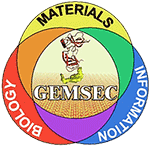Faculty from our department are either lead partners, core members or active participants in the following interdisciplinary centers and labs with facilities on or near the UW that research materials science.
- Boeing Advanced Research Center »
 The Boeing Advanced Research Center (BARC) represents a new paradigm in the execution of industrial research at the University of Washington. Boeing-employed affiliate instructors work in the lab side by side with faculty and students on joint research projects in the manufacturing and assembly of aircraft and spacecraft structures.
The Boeing Advanced Research Center (BARC) represents a new paradigm in the execution of industrial research at the University of Washington. Boeing-employed affiliate instructors work in the lab side by side with faculty and students on joint research projects in the manufacturing and assembly of aircraft and spacecraft structures.- Center of Excellence for Advanced Materials in Transport Aircraft Structures »
 The Center of Excellence for Advanced Materials in Transport Aircraft Structures (AMTAS) is a consortium of academic institutions, aerospace companies, and government agencies that are part of the FAA Joint Advanced Materials and Structures Center of Excellence (JAMS). AMTAS addresses safety and certification initiatives for existing, near- and long-term applications of composites and advanced materials for large transport commercial aircraft.
The Center of Excellence for Advanced Materials in Transport Aircraft Structures (AMTAS) is a consortium of academic institutions, aerospace companies, and government agencies that are part of the FAA Joint Advanced Materials and Structures Center of Excellence (JAMS). AMTAS addresses safety and certification initiatives for existing, near- and long-term applications of composites and advanced materials for large transport commercial aircraft.- Clean Energy Institute »
 The Clean Energy Institute (CEI) attracts researchers, faculty and students from multiple disciplines, including chemistry, chemical engineering, electrical engineering, mechanical engineering, materials science and engineering, and physics.
The Clean Energy Institute (CEI) attracts researchers, faculty and students from multiple disciplines, including chemistry, chemical engineering, electrical engineering, mechanical engineering, materials science and engineering, and physics.- Center for Materials and Devices for Information Technology Research »
 The Center for Materials and Devices for Information Technology Research (MDITR) Science and Technology Center was established by the National Science Foundation in 1987 to fund interdisciplinary research and education activities and encourage technology transfer.
The Center for Materials and Devices for Information Technology Research (MDITR) Science and Technology Center was established by the National Science Foundation in 1987 to fund interdisciplinary research and education activities and encourage technology transfer.- Genetically Engineered Materials Science & Engineering Center »
 At the Genetically Engineered Materials Science & Engineering Research Center (GEMSEC), an interdisciplinary team of scientists and engineers works to marry biology and materials sciences and engineering at the fundamental level. The research focus is adapting and developing molecular biology and genetics protocols to engineer peptides and proteins to synthesize, morphogenize, and assemble functional hierarchical structures for use in technologies and medicine.
At the Genetically Engineered Materials Science & Engineering Research Center (GEMSEC), an interdisciplinary team of scientists and engineers works to marry biology and materials sciences and engineering at the fundamental level. The research focus is adapting and developing molecular biology and genetics protocols to engineer peptides and proteins to synthesize, morphogenize, and assemble functional hierarchical structures for use in technologies and medicine.- Microscale Life Sciences Center (MLSC) »
- Understanding, predicting and diagnosing disease states is confounded by the inherent heterogeneity of in situ cell populations. The Microscale Life Sciences Center is focused on solving this problem by developing microscale technologies for single-cell genomic, transcriptomic, proteomic and physiological analyses, and applying that technology to fundamental problems of biology and health. The MLSC comprises the combined research expertise of leading researchers in their respective fields from Arizona State University, the University of Washington, the Fred Hutchinson Cancer Research Center and Brandeis University.
- Molecular Engineering & Sciences Institute »
 The Molecular Engineering & Sciences Institute (MolES) brings together faculty teams from across the University of Washington campus to catalyze translational research in the Clean Tech and Biotech areas. It is intended to serve both as an intellectual accelerator to bring fresh approaches and ideas to societal challenges and as a physical incubator where interdisciplinary teams can come together in a shared space.
The Molecular Engineering & Sciences Institute (MolES) brings together faculty teams from across the University of Washington campus to catalyze translational research in the Clean Tech and Biotech areas. It is intended to serve both as an intellectual accelerator to bring fresh approaches and ideas to societal challenges and as a physical incubator where interdisciplinary teams can come together in a shared space.- Flexible Hybrid Electronics Manufacturing Institute (NextFlex) »
 Mission is to advance manufacturing of printed electronics on flexible substrates with semiconductor devices in forms that can be attached to skin, vehicles, or other structures; or can be bent, rolled, folded, and integrated physically in ways that traditional rigid electronics cannot. The UW is a founding member of this national institute.
Mission is to advance manufacturing of printed electronics on flexible substrates with semiconductor devices in forms that can be attached to skin, vehicles, or other structures; or can be bent, rolled, folded, and integrated physically in ways that traditional rigid electronics cannot. The UW is a founding member of this national institute.
UW representative and technical council member: J. Devin MacKenzie. Contact: jdmacken@uw.edu.
 Mission is to advance manufacturing of printed electronics on flexible substrates with semiconductor devices in forms that can be attached to skin, vehicles, or other structures; or can be bent, rolled, folded, and integrated physically in ways that traditional rigid electronics cannot. The UW is a founding member of this national institute.
Mission is to advance manufacturing of printed electronics on flexible substrates with semiconductor devices in forms that can be attached to skin, vehicles, or other structures; or can be bent, rolled, folded, and integrated physically in ways that traditional rigid electronics cannot. The UW is a founding member of this national institute.